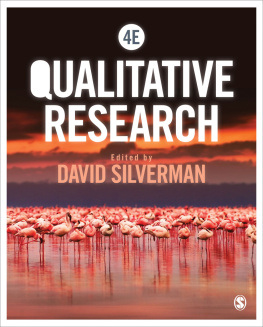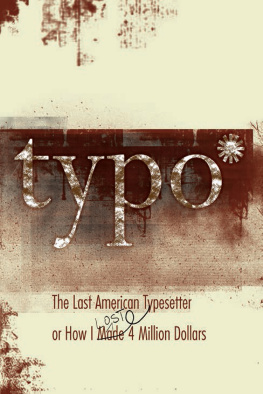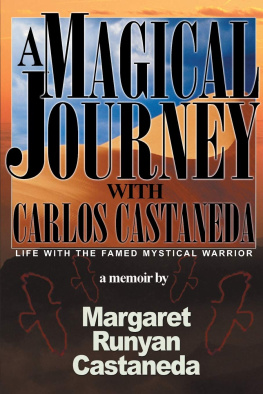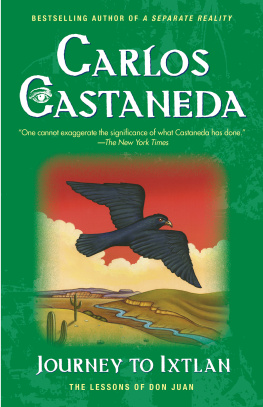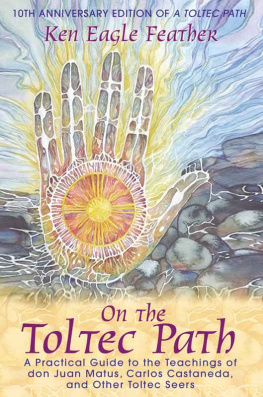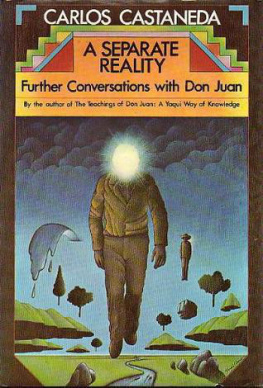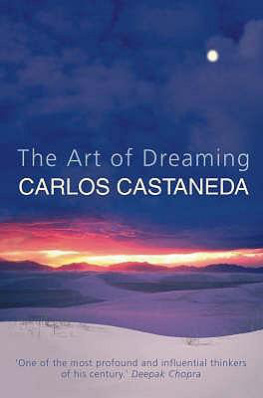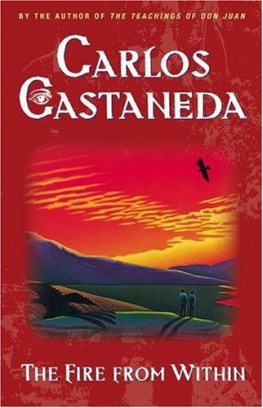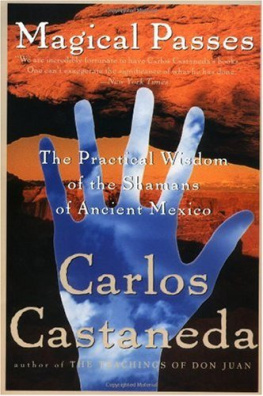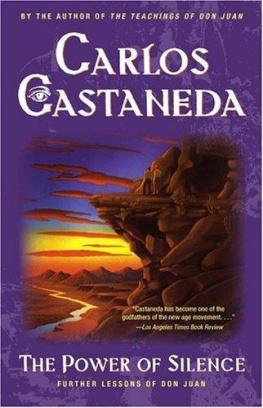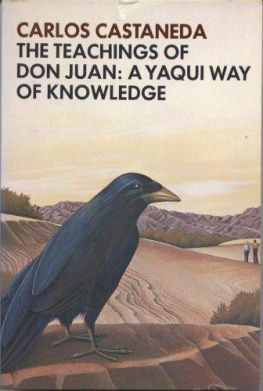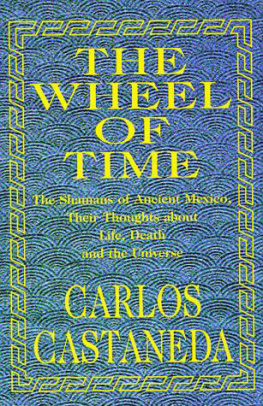Routledge Revivals
Reading Castaneda
Carlos Castanedas accounts of his meeting with the Yaqui Indian magician Don Juan are well known to sociologists both in Britain and in America. Using material largely from Castanedas The Teachings of Don Juan, David Silverman here seeks to introduce the student of Sociology to some of the central epistemological concerns of social science. First published in 1975, the title assumes no previous knowledge of Castaneda but instead uses his work as a springboard to wider issues, in particular making sense of our reality and understanding each other by using language and communication. This is an interesting reissue, which will be of particular value to students of the sociology of language and communication, as well as Communication Studies more generally.
First published in 1975
by Routledge & Kegan Paul Ltd
This edition first published in 2014 by Routledge
2 Park Square, Milton Park, Abingdon, Oxon, OX14 4RN
and by Routledge
711 Third Avenue, New York, NY 10017
Routledge is an imprint of the Taylor & Francis Group, an informa business
1975 David Silverman
The right of David Silverman to be identified as author of this work has been asserted by him in accordance with sections 77 and 78 of the Copyright, Designs and Patents Act 1988.
All rights reserved. No part of this book may be reprinted or reproduced or utilised in any form or by any electronic, mechanical, or other means, now known or hereafter invented, including photocopying and recording, or in any information storage or retrieval system, without permission in writing from the publishers.
Publishers Note
The publisher has gone to great lengths to ensure the quality of this reprint but points out that some imperfections in the original copies may be apparent.
Disclaimer
The publisher has made every effort to trace copyright holders and welcomes correspondence from those they have been unable to contact.
A Library of Congress record exists under LC control number: 75327454
ISBN 13: 978-0-415-73654-1 (hbk)
ISBN 13: 978-1-315-81841-2 (ebk)
Reading Castaneda
First published in 1975
by Routledge & Kegan Paul Ltd
39, Store Street
London WC1E 7DD,
Broadway House, Newtown Road
Henley-on-Thames, Oxon RG9 1EN and 9 Park Street
Boston, Mass. 02108, USA
Set in Monotype Imprint
Reprinted 1976
Reprinted 1979 in the United States of America by Vail-Ballou Press, Inc.
David Silverman 1975
No part of this book may be reproduced in any form without permission from the publisher, except for the quotation of brief passages in criticism
ISBN 0 7100 8146 4
Sociology rests on a happy irony. It seeks to study socially organized practices. Equally, it itself is inevitably a socially organized practice. Sociological descriptions, methods and claims to truth are brought off and recognized (like lay descriptions, methods and claims to truth) by and for members of a certain community. Their intelligibility resides in the games that each community plays and in the mode of existence which is expressed in playing these games. Necessarily, then, sociological accounts exemplify the very practices that they would describe. Near at hand, by every such account, stalks the demon of the infinite regress, threatening to push it (and the accounter) down a slope of unending accounts of accounts.
Yet a happy irony because a perceived need to counter this threat has produced some of the most significant work in the sociological tradition. To the European sociologists of the early twentieth century, the sociological enterprise could only be justified by establishing a site of difference for the sociologist as compared to the layman. For Durkheim and Weber, the sociologists claim to difference (deference?) arose in his attempt to seek causally adequate generalizations, putting on one side his societal commitments in favour of the white coat of scientific objectivity. To some modern sociologists, on the other hand, the only possible basis for knowledge of social processes resided in the sociologists membership of society. Rather than overcome that membership, he must seek to explicate it; for instance by examining how, despite the threat of an infinite regress, intelligible accounts are produced for the practical purposes at hand.
Unfortunately, one does not always study ones own society: sometimes the games that other communities play are unintelligible, and reference to what is taken for granted in your own society seems to be no use. In coming to grips with the socially organized practices of other societies, the sociologist or anthropologist displays most clearly the nature of his method. By continuously settling the issue of what is to count as an adequate description or explanation of social processes what the native informant tells you, what you understand as a member of another society, what is to be established by social science concepts or quantitative measures the researcher reveals his version of analysis.
One merit of Carlos Castanedas accounts of his meetings with the Yaqui Indian magician don Juan is that the reader is continually brought face-to-face with the socially organized practices that constitute not only don Juans world but also his own. Partly, this reflects Castanedas honesty in expressing his own doubts and uncertainties rather than offering a polished but empty scientific paper. Partly, it is a feature of don Juans often exasperating opaqueness, expressed in an apparent failure to clarify even what seems to be the most simple issue. Together with Castaneda, then, we learn that making sense together is not an easy affair and that whatever sense we do make involves a commitment to play a particular game. Because such problems seem to thrust themselves at us here, unlike the more familiar products of the social science community, Castanedas accounts provide a fitting occasion to re-view the basis of the sociological enterprise.
There is no requirement, however, to read Castanedas trilogy of books (The Teachings of Don Juan, A Separate Reality, Journey to Ixtlan) in order to follow my argument. For the sake of simplicity, all the passages I have quoted are taken from the first book, while, in each chapter, Castanedas text is used only as an initial springboard to more general issues. Suffice it to say that the books tell of the conversations and experiences of a California anthropology student during ten years of meetings with the circle of an old Mexican Indian, and of the formers attempts to understand the latters way of knowledge.
Two final points of clarification: (1) This does not seek to be an addition to the drug literature, assuming that such a corpus of texts exists. While Castaneda is introduced to a variety of hallucinogenic materials during the period of his apprenticeship to don Juan, this book does not enter into the debate about the effects of such drug use. Put crudely, I believe that more important issues are at stake here (and this seems to be recognized by both major protagonists). (2) It does not matter to me in the least whether any or all of the events reported by Castaneda ever took place. I have seen some contradictory factual evidence and there is also the issue of the apparent and curious similarity between don Juans utterances and those of one or two contemporary philosophers. Yet what text is not a construction? To take Castanedas text seriously seems to require us to bracket the question of its correspondence to any particular set of events.


